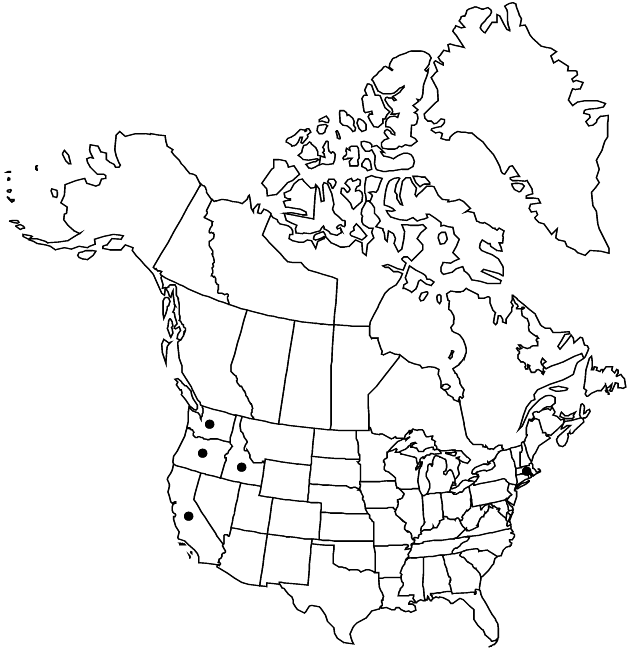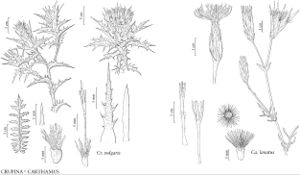Difference between revisions of "Crupina vulgaris"
in F. Cuvier, Dict. Sci. Nat. ed 2, 12: 68. 1818.
FNA>Volume Importer |
imported>Volume Importer |
||
| Line 8: | Line 8: | ||
}} | }} | ||
|common_names=Bearded creeper;common crupina | |common_names=Bearded creeper;common crupina | ||
| + | |special_status={{Treatment/ID/Special_status | ||
| + | |code=W | ||
| + | |label=Weedy | ||
| + | }}{{Treatment/ID/Special_status | ||
| + | |code=I | ||
| + | |label=Introduced | ||
| + | }}{{Treatment/ID/Special_status | ||
| + | |code=F | ||
| + | |label=Illustrated | ||
| + | }} | ||
|basionyms={{Treatment/ID/Basionym | |basionyms={{Treatment/ID/Basionym | ||
|name=Centaurea crupina | |name=Centaurea crupina | ||
| Line 30: | Line 40: | ||
|elevation=200–1000 m | |elevation=200–1000 m | ||
|distribution=Calif.;Idaho;Mass.;Oreg.;Wash.;Europe;w Asia. | |distribution=Calif.;Idaho;Mass.;Oreg.;Wash.;Europe;w Asia. | ||
| + | |introduced=true | ||
|discussion=<p>I have seen material only from California; occurrences in the other states listed are documented.</p><!-- | |discussion=<p>I have seen material only from California; occurrences in the other states listed are documented.</p><!-- | ||
--><p><i>Crupina vulgaris</i> is listed as a noxious weed by governmental agencies both within and outside of its documented range. It is a highly invasive species that infests pastures, rangelands, hayfields, and disturbed sites, sometimes forming dense pure stands. It is unpalatable to livestock and tends to increase as more desirable forage is consumed. Since it was first reported in west-central Idaho in 1969, it has spread rapidly in western rangelands, forming infestations in several states.</p> | --><p><i>Crupina vulgaris</i> is listed as a noxious weed by governmental agencies both within and outside of its documented range. It is a highly invasive species that infests pastures, rangelands, hayfields, and disturbed sites, sometimes forming dense pure stands. It is unpalatable to livestock and tends to increase as more desirable forage is consumed. Since it was first reported in west-central Idaho in 1969, it has spread rapidly in western rangelands, forming infestations in several states.</p> | ||
| Line 54: | Line 65: | ||
|publication title=in F. Cuvier, Dict. Sci. Nat. ed | |publication title=in F. Cuvier, Dict. Sci. Nat. ed | ||
|publication year=1818 | |publication year=1818 | ||
| − | |special status= | + | |special status=Weedy;Introduced;Illustrated |
| − | |source xml=https:// | + | |source xml=https://bibilujan@bitbucket.org/aafc-mbb/fna-data-curation.git/src/bb6b7e3a7de7d3b7888a1ad48c7fd8f5c722d8d6/coarse_grained_fna_xml/V19-20-21/V19_199.xml |
|tribe=Asteraceae tribe Cardueae | |tribe=Asteraceae tribe Cardueae | ||
|genus=Crupina | |genus=Crupina | ||
Revision as of 21:35, 27 May 2020
Plants to 8 cm. Stems leafy to branches, openly branched, ridged. Leaves: basal often absent by anthesis, blades oblong to obovate, margins entire or dentate to deeply pinnately divided, scabrous, ciliate with glochidiate-tipped bristles; cauline 1–3.5 cm, 1–2-pinnately divided into linear lobes, ciliate with glochidiate-tipped bristles. Peduncles slender, 0.5–8 cm, bractless or with 1–several scalelike to linear bracts. Involucres sometimes falling at maturity with enclosed cypselae, 8–20 mm. Sterile florets 2–4. Fertile florets usually 1; corollas ca. 14 mm, tube with branched hairs. Cypselae usually 1 per head, barrel-shaped, 3–6 × 1.5–3.5 mm, attachment scar basal; pappus bristles in 2 unequal series, widely spreading, blackish brown, 5–10 mm; pappus scales erect, 0.5–1 mm. 2n = 28 (Greece), 30 (Yugoslavia).
Phenology: Flowering spring–summer (Jun–Aug).
Habitat: Grassy areas, roadsides, open woodlands, forests
Elevation: 200–1000 m
Distribution

Introduced; Calif., Idaho, Mass., Oreg., Wash., Europe, w Asia.
Discussion
I have seen material only from California; occurrences in the other states listed are documented.
Crupina vulgaris is listed as a noxious weed by governmental agencies both within and outside of its documented range. It is a highly invasive species that infests pastures, rangelands, hayfields, and disturbed sites, sometimes forming dense pure stands. It is unpalatable to livestock and tends to increase as more desirable forage is consumed. Since it was first reported in west-central Idaho in 1969, it has spread rapidly in western rangelands, forming infestations in several states.
Selected References
None.
